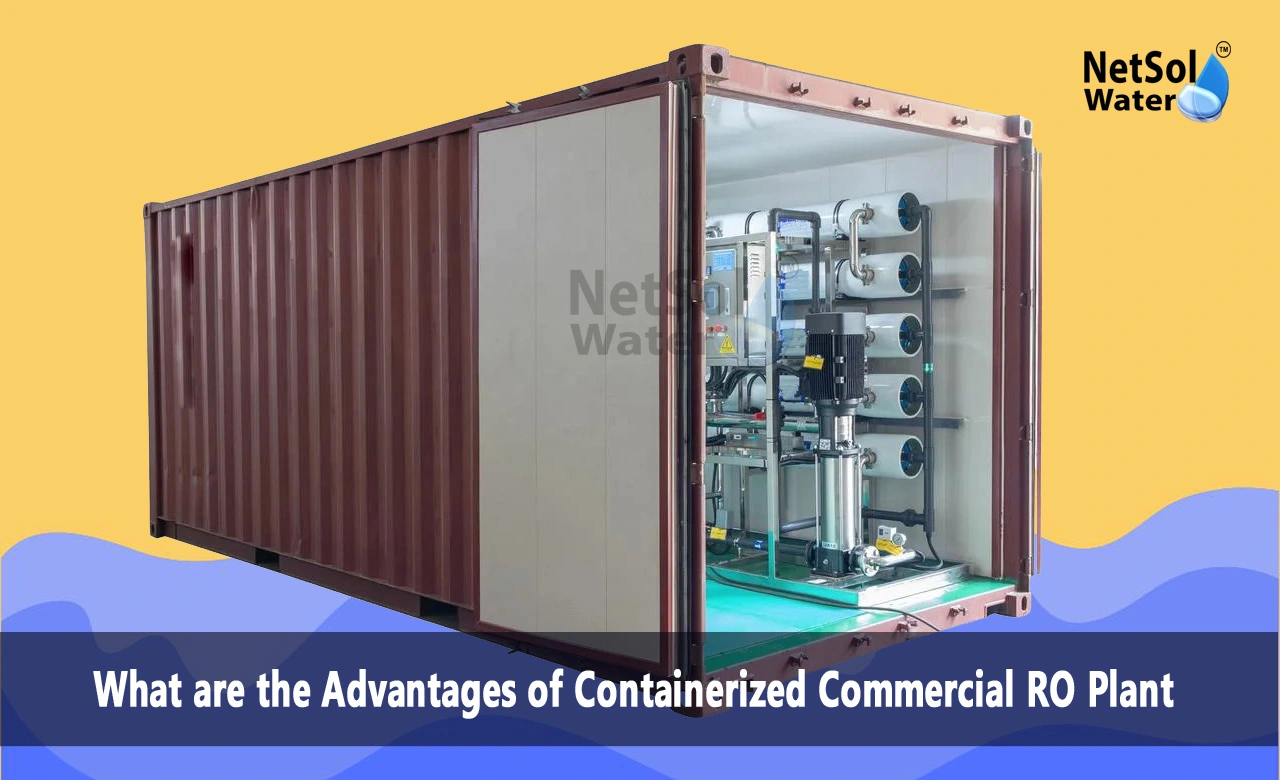What are the Advantages of Containerized Commercial RO Plant?
Commercial RO plants are known for their efficiency and reliability in water purification. However, as businesses and industries evolve, traditional RO setups may face limitations in terms of mobility, scalability, and ease of deployment. Containerized commercial RO plant offer a modern innovation to address these challenges. We explore the advantages of adopting containerized RO plants for commercial applications.
Advantages of Containerized Commercial RO Plant
Flexibility and Mobility:
Containerized RO plants offer unparalleled flexibility, allowing businesses to set up water purification systems swiftly and effortlessly. These units are housed within standard shipping containers, enabling easy transportation via land, sea, or air. Whether it's a remote construction site, a disaster relief operation, or a temporary industrial project, containerized RO plants can be deployed wherever clean water is needed, mitigating logistical constraints.
Rapid Deployment:
Time is of the essence in many commercial ventures, and traditional RO plants may take considerable time to install and commission. Conversely, containerized RO plants are designed for rapid deployment. Pre-fabricated within robust containers, these systems are pre-tested and pre-assembled, minimizing on-site setup time and accelerating the commencement of water purification operations. This rapid deployment capability translates to cost savings and enhanced operational efficiency for businesses.
Scalability and Modularity:
Commercial enterprises often encounter fluctuating water demand due to seasonal variations or project-specific requirements. Containerized RO plants offer inherent scalability and modularity, allowing businesses to adjust their water purification capacity according to evolving needs. Additional container units can be seamlessly integrated into existing setups, enabling on-the-fly expansion without disrupting ongoing operations. This scalability feature ensures optimal resource utilization and future-proofing of water treatment infrastructure.
Cost-Effectiveness:
Traditional RO plants entail significant capital investments in infrastructure, land acquisition, and construction. Conversely, containerized RO solutions present a cost-effective alternative, eliminating the need for extensive civil works and site preparations. Moreover, the modular nature of containerized units allows businesses to align capital expenditure with operational demands, avoiding upfront investments in excess capacity. The streamlined installation process further reduces labor costs and time-to-market, enhancing overall cost-effectiveness.
Environmental Sustainability:
As sustainability gains prominence across industries, businesses are increasingly prioritizing eco-friendly solutions for their operations. Containerized RO plants contribute to environmental sustainability in multiple ways. By optimizing water usage and minimizing wastewater generation, these systems help conserve precious resources and reduce ecological footprint. Furthermore, the modular design facilitates energy-efficient operation, enabling businesses to lower their carbon emissions and comply with regulatory requirements.
Reliability and Performance:
Water quality is paramount in commercial applications, where subpar purification can jeopardize product integrity or compromise industrial processes. Containerized RO plants uphold stringent quality standards, delivering reliable performance across diverse operating conditions. Equipped with state-of-the-art filtration membranes and advanced monitoring systems, these units ensure consistent water purity levels while mitigating the risk of system downtime or contamination incidents. Such reliability instills confidence among businesses and fosters long-term partnerships with solution providers.
Remote Monitoring and Control:
In an era characterized by connectivity and digitalization, remote monitoring and control capabilities are indispensable for efficient operation and maintenance. Containerized RO plants are equipped with advanced control systems and telemetry features, enabling real-time monitoring of key performance parameters from anywhere in the world. Operators can remotely adjust operational settings, diagnose potential issues, and schedule preventive maintenance tasks, thereby optimizing system uptime and prolonging equipment lifespan.
Compliance and Regulatory Compliance:
Regulatory compliance is a non-negotiable aspect for businesses operating in regulated industries such as food and beverage, pharmaceuticals, and healthcare. Containerized RO plants adhere to stringent quality standards and regulatory requirements, ensuring that treated water meets or exceeds relevant purity criteria. By providing consistent compliance documentation and audit trails, these systems facilitate regulatory approvals and streamline certification processes, thereby safeguarding businesses against legal liabilities and reputational risks.
Conclusion
Containerised commercial RO plants are a big step forward in water purification for businesses. They offer great flexibility, scalability, and performance for a wide range of commercial uses. By using these new solutions, businesses can save money, be more environmentally friendly, and comply with regulations more easily. As industries continue to change, containerized RO plants are set to completely change how businesses treat water. This will help them succeed in a more competitive and fast-paced market.
Do you need an advice or assistance on selecting the best water and waste water treatment unit? We have solutions for all your problems!
Let us know your problem, our experts will make sure that it goes away.
For an assistance or related query,
Call on +91-965-060-8473 Or write us at enquiry@netsolwater.com



